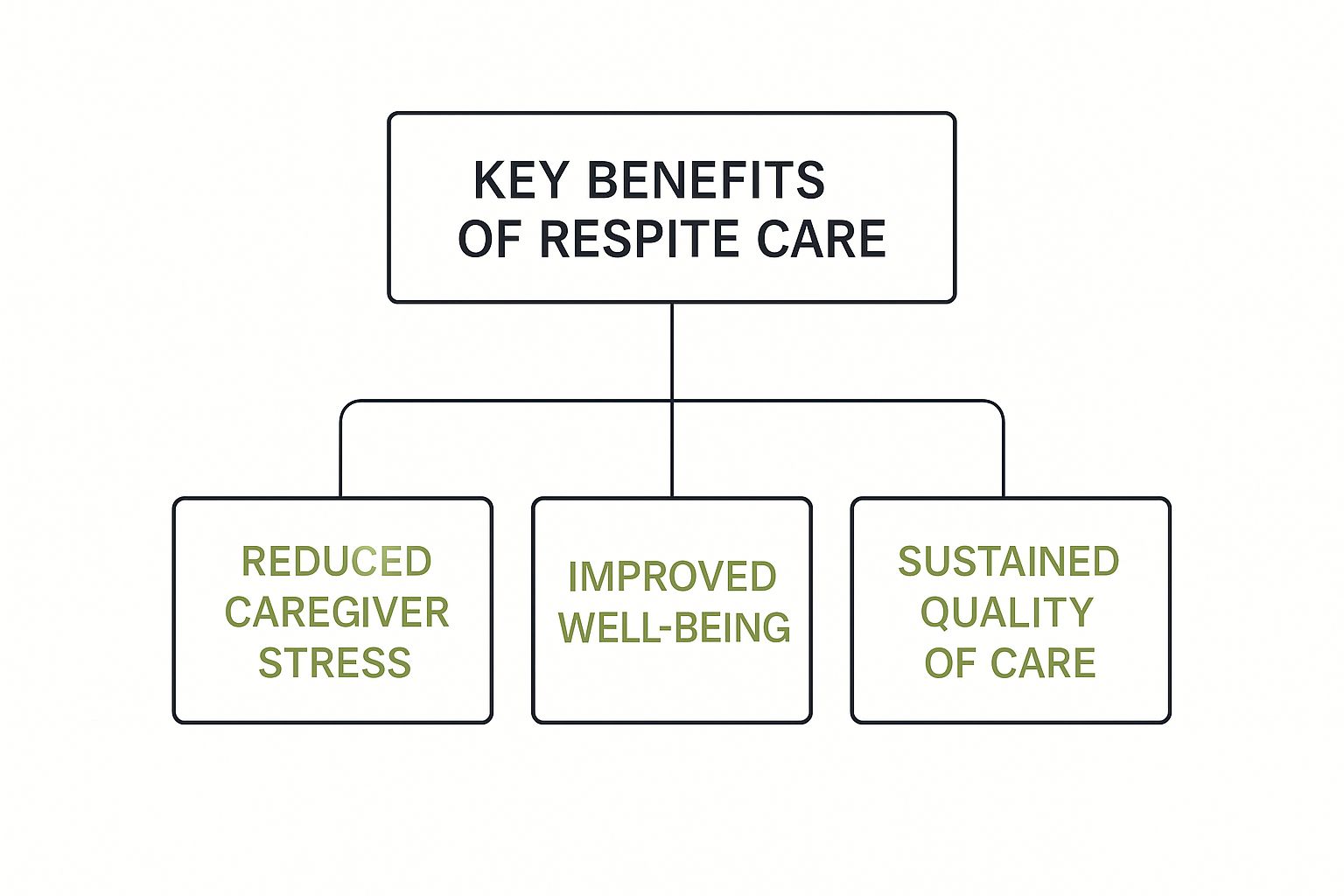When you’re a carer, you’re playing one of the most demanding roles imaginable. Respite care for carers is, quite simply, a short-term support service designed to give you a much-needed break from your daily responsibilities. It’s not a luxury—it’s an essential part of a sustainable care plan that protects your own wellbeing, so you can continue providing the best support for your loved one.
What Is Respite Care and Why Does It Matter?

Think of caregiving as a marathon, not a sprint. Every marathon runner needs a water station to rest and refuel, and that’s exactly what respite care is. It’s that planned pause that lets you step away, recharge your batteries, and avoid hitting a wall.
This temporary support ensures the person you look after continues to receive safe, professional care while you take time for yourself. Whether that’s for a few hours a week to run errands or a couple of weeks to go on holiday, this break is absolutely vital.
More Than Just a Break
The need for respite care is growing right across the UK. With an ageing population and increasingly complex care needs, the number of unpaid carers is huge. There are currently around 5.8 million unpaid carers in the country, and all projections show a rising demand for services that can support them.
Taking a break isn’t selfish; it’s a strategic necessity. It’s an acknowledgement that your own health—physical, mental, and emotional—is just as important. If you ignore your own needs, it can lead to exhaustion, stress, and ultimately, a reduced ability to provide the compassionate care your loved one deserves.
Respite care is a lifeline. It validates the immense pressure carers are under and provides a structured way to manage the emotional and physical toll of the role, ensuring both you and the person you care for can thrive.
The Benefits of Taking Time for Yourself
When you prioritise your own wellbeing through respite, you directly improve the quality of care you can offer. It’s that simple. By scheduling regular breaks, you can:
- Prevent burnout: Continuous caregiving is a fast track to physical and emotional exhaustion. Stepping away helps you reset and come back with renewed energy.
- Maintain your own identity: A break allows you to reconnect with hobbies, friends, and the activities that make you you, outside of your caring role.
- Improve relationships: Sometimes, a little time apart can reduce strain and help you maintain a healthier, more positive relationship with the person you look after.
Understanding what respite care for the elderly involves is the first step. It's all about creating a sustainable routine that honours your commitment while protecting your own indispensable wellbeing.
Exploring Your Respite Care Options
Once you realise you need a break, the next step is figuring out what kind of support is actually available. Respite care isn't a one-size-fits-all solution; it's more like a menu of options designed to fit different needs, schedules, and personalities. The right choice really comes down to your family's unique situation.
This variety means you can find something that works, whether you just need a few hours to get to a doctor's appointment or a full two weeks for a proper holiday. The goal is always the same: to find a balance that gives you a meaningful break while making sure the person you look after feels safe, comfortable, and well-cared-for.
Finding the Right Fit for Your Family
Most respite care falls into a few main categories, each with its own advantages. Getting to grips with these will help you make a much more informed decision.
- In-Home Respite: This is where a professional carer comes to your home. It’s often the best choice for keeping things consistent, as it minimises disruption by letting your loved one stay in their familiar surroundings. You can arrange it for just a few hours, a whole day, or even overnight.
- Residential or Care Home Stays: For longer breaks, the person you care for can have a short stay in a residential care home. This gives them a change of scenery and a chance to socialise, all within a safe, professionally staffed setting.
- Day Centres: These centres offer structured activities, social time, and professional care during the day. It’s a great option if you’re looking for a regular, scheduled break each week while the person you care for gets to enjoy a stimulating and supportive environment.
This image below really drives home how these services help, especially when it comes to reducing stress and boosting your own well-being.

As you can see, each type of respite plays a part in making the whole caregiving journey more sustainable by tackling carer burnout head-on.
To help you weigh your options, this table breaks down the main types of respite care.
Comparing Respite Care Options
| Type of Care | Best For | Typical Duration | Key Benefit |
|---|---|---|---|
| In-Home Respite | Maintaining routine and familiar surroundings. | A few hours to overnight stays. | Minimal disruption for the person being cared for. |
| Residential Stays | Longer breaks like holidays or recovery periods. | Several days to a few weeks. | 24/7 professional support and a change of scenery. |
| Day Centres | Regular, scheduled daytime breaks for carers. | A few hours to a full day, weekly. | Social interaction and structured activities for your loved one. |
| Informal Support | Short, spontaneous, or last-minute breaks. | A few hours as needed. | Flexible and relies on trusted friends or family. |
Thinking through these points can help clarify which route might be the best starting point for your family.
Informal Support and Self-Care
Don't forget about the power of your own network. Leaning on trusted family members or friends for a few hours can be an absolute lifeline, especially for those short, spontaneous breaks when you really need them.
Remember, respite is also about actively recharging yourself. It's about taking time to do something that is just for you, which is crucial for maintaining your own sense of self.
When you're looking at different respite options, think about including some personal wellness activities in your break. Investing in yourself with things like gentle spa services for self-care can do wonders for a tired mind and body. This kind of personal time is just as valid—and necessary—as any formal care arrangement. The key is finding what truly helps you recharge.
Recognising the Signs You Need a Break

When you're completely focused on someone else’s wellbeing, it's remarkably easy to let your own needs slide. Pushing them aside can feel like just another part of the job, but learning to spot the signs of burnout is the first, most crucial step toward getting the support you deserve.
These signals are your body and mind telling you that your reserves are running dangerously low. Acknowledging them isn’t a sign of weakness; it’s a sign of self-awareness and strength. It's the point where you realise that seeking respite care for carers is a necessary act of self-preservation.
The Emotional Toll of Constant Care
One of the first places stress tends to show up is in your emotions. You might find your patience wearing thin far more quickly than usual, or feel a persistent sense of being overwhelmed, as if you’re constantly treading water just to stay afloat.
These feelings are valid and incredibly common among carers. They often manifest in specific ways:
- Irritability and frustration: Snapping at small things or feeling constantly on edge.
- Feelings of hopelessness: A sense that things will never get better or that you’re trapped.
- Anxiety or low mood: A constant state of worry or a flatness that you just can’t seem to shake.
Ignoring these emotional cues can lead to more serious issues down the line. It's important to understand how respite care supports families and prevents burnout by giving you the space to process these feelings and recharge.
Physical and Social Red Flags
The strain of caregiving doesn’t just stay in your mind; it impacts your body and your social life, too. Physical exhaustion is often the most obvious sign, but it goes far beyond simply feeling tired. It’s a deep-seated fatigue that sleep just doesn’t seem to fix.
You might also notice changes in your social habits. Withdrawing from friends or losing interest in hobbies you once loved are clear indicators that your caring role is starting to consume your personal identity.
Taking a break is not a luxury—it is an essential part of your toolkit as a carer. It restores your energy, clarifies your perspective, and allows you to return to your role with renewed compassion and patience.
Beyond formal respite services, many carers find immense value in personal breaks focused on self-care. It's worth exploring the benefits of rural retreats for wellbeing, which can provide a peaceful environment to truly disconnect. Recognising these signs is your permission slip to seek help before you reach a crisis point.
How to Get Funding for Respite Care
Figuring out the financial side of respite care often feels like the biggest hurdle. The good news is that support is available, but the key is knowing where to look and how to get started. Securing funding isn’t about jumping through endless hoops; it’s a process with clear steps designed to get you the support you’re entitled to.
The journey to financial assistance nearly always begins with a Carer's Assessment. This is a free assessment organised by your local council’s adult social services department. It’s not a test of your caregiving skills—far from it. It’s a conversation focused entirely on you and the impact your caring role has on your life.
Its whole purpose is to figure out your needs and see what kind of support could help you maintain your own wellbeing. Think of this assessment as your formal gateway to accessing council-funded support, including financial help for respite care.
Your First Step: The Carer's Assessment
To kick things off, you just need to contact your local authority and ask for a Carer's Assessment. During the assessment, a social care professional will chat with you about your situation, looking at things like:
- Your physical, mental, and emotional health.
- Your ability to juggle work, family life, and social activities.
- Whether you feel willing and able to carry on caring.
Be as honest and open as you can during this conversation. The more detail you give about your daily challenges, the clearer the picture the council will have of the support you need. The outcome could be a direct payment—money you can use to arrange your own respite care—or the council might organise services for you directly.
A Carer's Assessment is your right, no matter your financial situation or how much care you provide. It’s the official starting point for unlocking the financial help available for respite care for carers.
Exploring Other Funding Avenues
While council funding is the main route, it’s not the only one. Depending on the health needs of the person you care for, other options might be on the table.
- NHS Continuing Healthcare (CHC): If the person you look after has significant and complex ongoing health needs, they may be eligible for CHC funding. This is a package of care funded entirely by the NHS, which can include respite services. Eligibility is based purely on their health needs after a detailed assessment, not their finances.
- Charitable Grants: Many national and local charities offer grants to carers for breaks and essential items. Organisations like the Carers Trust and Turn2us have tools that can help you search for grants you might be eligible for. These grants are often a lifeline, especially for those who don’t qualify for council funding.
While support is out there, it's important to be realistic about the current landscape. Respite care is a vital lifeline for unpaid carers, yet the provision of these services has sadly been shrinking. Data shows that the number of carers receiving respite care fell from 57,000 in 2015/16 to just 36,000 in 2023/24, highlighting a growing gap between need and what’s available. You can read more about these social care trends at The King's Fund. This makes exploring every possible funding avenue more important than ever.
Finding and Arranging Respite Services

Once you’ve decided you need a break, the next step is turning that decision into a reality. This part of the journey can feel a bit daunting, but if you break it down into manageable steps, arranging respite care for carers becomes a much simpler process. The key is to be methodical, ask the right questions, and keep the lines of communication open.
The first, and often most delicate, step is bringing up the idea with the person you look after. Try framing the conversation around the benefits for both of you—explaining that a short break will help you recharge so you can continue providing the best possible support. When you involve them from the start, maybe by looking at different providers together, it helps them feel more in control and comfortable with the plan.
Researching and Vetting Providers
With their agreement, you can start looking into potential care providers. Your local council’s adult social services department is an excellent place to begin, as they can give you a list of approved agencies and care homes in your area. Online directories and word-of-mouth recommendations from other carers can also be incredibly useful.
Once you have a shortlist, it’s time to vet each option carefully. In England, the Care Quality Commission (CQC) is the independent regulator for all health and social care services.
Checking a provider's CQC rating is non-negotiable. It gives you an impartial assessment of their safety, effectiveness, and quality of care, providing essential peace of mind that your loved one will be in good hands.
A "Good" or "Outstanding" rating is a strong sign of a high-quality service. You should also get a list of specific questions ready to ask potential providers.
Key Questions to Ask a Respite Care Provider
Making an informed choice comes down to getting clear answers. Here are some essential questions to guide your conversations:
- Staffing and Training: What qualifications and training do your carers have? Do they have experience with specific conditions your loved one has, like dementia?
- Creating a Care Plan: How do you put together a personalised care plan? How will you make sure my loved one’s routine, preferences, and needs are fully understood and followed?
- Communication: How will you keep in touch with me while I’m away? What’s your procedure for handling emergencies?
- Costs and Contracts: Can you give me a clear breakdown of all costs? What is your cancellation policy?
Finding reliable respite care in Newcastle-under-Lyme and the surrounding areas involves this kind of thorough approach. Once you’re happy with the answers and have checked their CQC report and references, you can move forward with creating a detailed care plan to ensure a smooth, worry-free transition for everyone involved.
Local Support in Stoke and Newcastle-under-Lyme
While national advice is a great starting point, knowing who to call in your own community is what really makes a difference. If you're looking for respite care for carers in Stoke-on-Trent or Newcastle-under-Lyme, there are some fantastic local organisations ready to give you direct, practical support.
The best place to begin is often with your local council. Getting in touch with the adult social care department at either Stoke-on-Trent City Council or Staffordshire County Council is your first step towards getting a Carer’s Assessment. Think of this assessment as your official pathway to accessing council-funded support and services for respite.
Key Local Organisations
Beyond the council, a handful of brilliant charities and community groups offer invaluable help. These organisations know the challenges carers in our area face inside and out, and they provide everything from a listening ear to hands-on support.
- North Staffs Carers Association: This is a dedicated local charity offering information, advocacy, and direct support just for carers across North Staffordshire. They are experts at guiding you through your options and connecting you with the right services.
- Local Support Groups: Don't underestimate the power of peer support. Numerous smaller groups meet across Stoke and Newcastle-under-Lyme, giving you a chance to share experiences with others who truly get what you’re going through.
It's also worth remembering that older carers are a significant and often overlooked group. Across the UK, there are around 2.1 million carers aged 65 and over, with a huge number well into their 80s. These incredible individuals are often managing their own health issues while looking after a loved one, facing serious financial and emotional strain. You can find out more about the specific challenges older carers face from Age UK.
Getting in touch with these local bodies is the fastest way to turn your need for a break into a real, tangible plan. They’re there to help you make sense of the system and find the right support for your unique situation.
Your Respite Care Questions Answered
Dipping your toe into the world of respite care naturally brings up a lot of questions. From navigating finances to managing feelings of guilt, it's completely normal to have concerns. We've put together some clear, straightforward answers to the queries we hear most often from carers, helping you find your footing and move forward with confidence.
Will Using Respite Care Affect My Carer's Allowance?
This is one of the first things carers ask, and it’s a really important one. Taking a break can affect your Carer's Allowance, but it all depends on how long that break is.
As a general rule, you can take up to four weeks of breaks in any six-month period without it having any impact on your payments.
If the person you look after needs to go into hospital, your allowance will usually stop after 28 days. It is absolutely vital to let the Carer's Allowance Unit know about any changes like this to avoid being overpaid. The rules can change, so it's always a good idea to check the latest government guidance to be sure.
How Can I Overcome Feeling Guilty About Taking a Break?
Guilt is an incredibly common—and powerful—emotion for carers. But it's so important to reframe how you see respite. Taking a break isn't a selfish act; it's essential maintenance. Think of it like servicing a car—it allows you to keep running smoothly and be a better, more resilient carer in the long run.
Respite is a proactive step towards sustainability. It prevents burnout, protects your wellbeing, and ensures you can continue providing compassionate care without sacrificing your own health in the process.
If you're feeling hesitant, start small. A few short breaks can help build confidence for both you and the person you care for, easing you both into the idea. It can also be a massive help to connect with other carers in support groups—you'll quickly realise you're not alone in feeling this way. At the end of the day, you can't pour from an empty cup.
What if the Person I Care for Refuses Respite Care?
It’s completely understandable for someone to resist a change in their routine, especially when it involves their care. The best way forward is to start with an open and honest conversation. Try to focus on the positives—how a short break for you will help you keep providing the best possible support for them.
Get them involved in the decision-making process wherever you can. Let them help choose a provider or plan the activities they'll do during the respite period. Sometimes, suggesting a short 'trial run', like a two-hour visit from a home carer, can help ease their anxieties and show them that it can be a really positive experience.
Patience and a gentle introduction are the keys to making it work for everyone. You can learn more about why respite care is crucial for family caregiver wellbeing in our related article.
At Cream Home Care, we understand the questions and concerns that come with arranging respite care. If you're in Stoke-on-Trent or Newcastle-under-Lyme and need support, our compassionate team is here to help you find a solution that brings peace of mind to your entire family. Visit us at https://creamhomecare.co.uk to learn more about our personalised services.





